|
|
|
Sort Order |
|
|
|
Items / Page
|
|
|
|
|
|
|
| Srl | Item |
| 1 |
ID:
132468
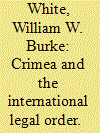

|
|
|
|
|
| Publication |
2014.
|
| Summary/Abstract |
Putin's exploitation of the tension between the principles of non-intervention and self-determination is in the tradition of great-power interaction with international law. But Russia's interpretation sets dangerous precedents.
Crimea is Russia's. The March 2014 referendum and Russia's subsequent annexation of Crimea are now events of history, even while the territorial borders and political future of the rest of Ukraine remain contested. Yet, as international attention has moved from Sevastopol to Kiev and more recent crises elsewhere, a key balance between two of the most fundamental principles of the post-Second World War international legal and political order remains at stake.
|
|
|
|
|
|
|
|
|
|
|
|
|
|
|
|
| 2 |
ID:
109833
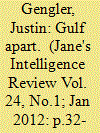

|
|
|
| 3 |
ID:
139670
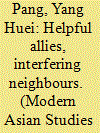

|
|
|
|
|
| Summary/Abstract |
In the aftermath of the Korean War, the People’s Republic of China was effectively an international pariah. Accounts of this period in Chinese textbooks emphasize how the Chinese turned this around, either during the Geneva Conference or the Bandung Conference, through deft planning and enterprise. Yet few pay any attention to how such manipulation of world opinion became increasingly difficult for Beijing after that initial success. One outcome of
China’s public relations campaign meant friendly Afro-Asia leaders voiced their opinions, in alarming numbers, to their Chinese counterparts regarding issues such as Asian security,mainland China’s economic development, and the Taiwan problem. Indeed, recently declassifiedChinese Foreign Affairs archive documents demonstrate that China tried to marshal such non-Soviet bloc opinions to its advantage during the first Taiwan Strait crisis (1955). Chinese efforts were successful in that there was no lack of volunteers to air dissent with American foreign policy. But these new allies also wished to mediate between the United
States and the Republic of China, on the one side, and mainland China on the other. Moreover, such efforts were often at variance with China’s domestic and strategic outlook in the region. China thus had to embark upon an active ‘management’ of disparate world opinions, which was an entirely new endeavour. Although China tried to provide a sanitized ‘script’ for its new friends, most had their own ideas. By the time of the second Taiwan Strait crisis (1958), the
volume of third party interference had grown.Overwhelmed by such international attention, China responded by openly rejecting unwelcomemediation efforts and demanded outright condemnation of the United States. Thus, ironically, with its growing prominence on the international stage, China found itself unbearably weighted down by the burden of world opinion, a position previously occupied by the United States.
|
|
|
|
|
|
|
|
|
|
|
|
|
|
|
|
| 4 |
ID:
133137
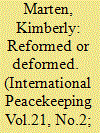

|
|
|
|
|
| Publication |
2014.
|
| Summary/Abstract |
A great deal of international attention and funding was given to reform and training of the Palestinian Authority Security Forces (PASF), starting with the Oslo Accords process in 1993 and accelerating with the advent of Fayyadism and the expulsion of the Palestinian Authority government from Gaza in 2007. Many donors and other supporters in the US, the EU, and Israel claimed this process as a success story, and indeed from 2008-2010 local conditions looked hopeful in the fragile, post-conflict West Bank proto-state. But soon unresolved political conflicts inside the West Bank encouraged patronage-based violence to reemerge within the security forces, and the fractured approach of the international community aggravated the situation. By 2013 reform had stalled. This article explores the history of patronage politics in the PASF and uses the Palestinian example to highlight the tensions inherent in contested visions of security, when international donors define success in terms of anti-terrorism rather than genuine domestic security governance.
|
|
|
|
|
|
|
|
|
|
|
|
|
|
|
|
| 5 |
ID:
133139
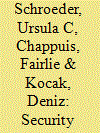

|
|
|
|
|
| Publication |
2014.
|
| Summary/Abstract |
Comprehensive Security Sector Reform (SSR) has become a crucial component of many international peace- and statebuilding operations. The paper assesses the consequences of these attempts to foster international standards of 'democratic security governance' in the security sectors of post-conflict or fragile states. The paper builds on qualitative case study research of SSR interventions in Timor-Leste, Liberia, and the Palestinian Territories, conducted 2010-2012, to trace patterns of adoption, adaptation or rejection of international security governance standards by domestic actors. The article uses insights from sociological organization theories to identify different types of 'hybrid security orders' that result from encounters between international and domestic models of security governance in SSR processes.
|
|
|
|
|
|
|
|
|
|
|
|
|
|
|
|
|
|
|
|
|